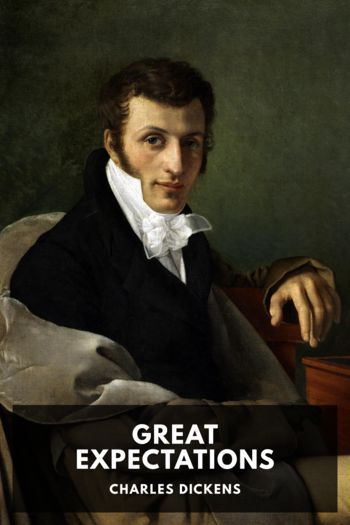Great Expectations - Charles Dickens (read books for money txt) 📗

- Author: Charles Dickens
Book online «Great Expectations - Charles Dickens (read books for money txt) 📗». Author Charles Dickens
It was the afternoon coach by which I had taken my place, and, as winter had now come round, I should not arrive at my destination until two or three hours after dark. Our time of starting from the Cross Keys was two o’clock. I arrived on the ground with a quarter of an hour to spare, attended by the Avenger—if I may connect that expression with one who never attended on me if he could possibly help it.
At that time it was customary to carry Convicts down to the dockyards by stagecoach. As I had often heard of them in the capacity of outside passengers, and had more than once seen them on the high road dangling their ironed legs over the coach roof, I had no cause to be surprised when Herbert, meeting me in the yard, came up and told me there were two convicts going down with me. But I had a reason that was an old reason now for constitutionally faltering whenever I heard the word “convict.”
“You don’t mind them, Handel?” said Herbert.
“O no!”
“I thought you seemed as if you didn’t like them?”
“I can’t pretend that I do like them, and I suppose you don’t particularly. But I don’t mind them.”
“See! There they are,” said Herbert, “coming out of the Tap. What a degraded and vile sight it is!”
They had been treating their guard, I suppose, for they had a gaoler with them, and all three came out wiping their mouths on their hands. The two convicts were handcuffed together, and had irons on their legs—irons of a pattern that I knew well. They wore the dress that I likewise knew well. Their keeper had a brace of pistols, and carried a thick-knobbed bludgeon under his arm; but he was on terms of good understanding with them, and stood with them beside him, looking on at the putting-to of the horses, rather with an air as if the convicts were an interesting Exhibition not formally open at the moment, and he the Curator. One was a taller and stouter man than the other, and appeared as a matter of course, according to the mysterious ways of the world, both convict and free, to have had allotted to him the smaller suit of clothes. His arms and legs were like great pincushions of those shapes, and his attire disguised him absurdly; but I knew his half-closed eye at one glance. There stood the man whom I had seen on the settle at the Three Jolly Bargemen on a Saturday night, and who had brought me down with his invisible gun!
It was easy to make sure that as yet he knew me no more than if he had never seen me in his life. He looked across at me, and his eye appraised my watch-chain, and then he incidentally spat and said something to the other convict, and they laughed and slued themselves round with a clink of their coupling manacle, and looked at something else. The great numbers on their backs, as if they were street doors; their coarse mangy ungainly outer surface, as if they were lower animals; their ironed legs, apologetically garlanded with pocket handkerchiefs; and the way in which all present looked at them and kept from them; made them (as Herbert had said) a most disagreeable and degraded spectacle.
But this was not the worst of it. It came out that the whole of the back of the coach had been taken by a family removing from London, and that there were no places for the two prisoners but on the seat in front behind the coachman. Hereupon, a choleric gentleman, who had taken the fourth place on that seat, flew into a most violent passion, and said that it was a breach of contract to mix him up with such villainous company, and that it was poisonous, and pernicious, and infamous, and shameful, and I don’t know what else. At this time the coach was ready and the coachman impatient, and we were all preparing to get up, and the prisoners had come over with their keeper—bringing with them that curious flavor of bread-poultice, baize, rope-yarn, and hearthstone, which attends the convict presence.
“Don’t take it so much amiss, sir,” pleaded the keeper to the angry passenger; “I’ll sit next you myself. I’ll put ’em on the outside of the row. They won’t interfere with you, sir. You needn’t know they’re there.”
“And don’t blame me,” growled the convict I had recognized. “I don’t want to go. I am quite ready to stay behind. As fur as I am concerned anyone’s welcome to my place.”
“Or mine,” said the other, gruffly. “I wouldn’t have incommoded none of you, if I’d had my way.” Then they both laughed, and began cracking nuts, and spitting the shells about.—As I really think I should have liked to do myself, if I had been in their place and so despised.
At length, it was voted that there was no help for the angry gentleman, and that he must either go in his chance company or remain behind. So he got into his place, still making complaints, and the keeper got into the place next him, and the convicts hauled themselves up as well as they could, and the convict I had recognized sat behind me with his breath on the hair of my head.
“Goodbye, Handel!” Herbert called out as we started. I thought what a blessed fortune it was, that he had found another name for me than Pip.
It is impossible to express with what acuteness I felt the convict’s breathing,





Comments (0)